Real-Estate: Affordable Housing a Success Despite Problems in the Industry
Aaref Hejres, Managing Director of Diyar Al Muharraq
The other thing is affordable housing. We have been very successful and have designed around 340 affordable homes. Stage 1 sold out within ten days and Stage 2 will be released soon with more affordable homes.
Interview with Aaref Hejres, Managing Director of Diyar Al Muharraq
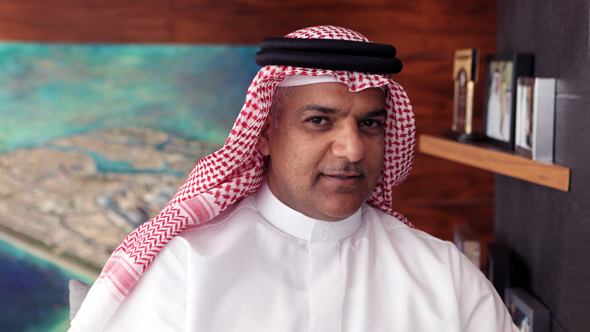
Diyar Al Muharraq plans to offer tenders in 2012 as a part of the project’s ongoing development. How did the offering proceed as planned in 2012?
The other thing is
affordable housing
. We have been very successful and have designed around 340 affordable homes. Stage 1 sold out within ten days and Stage 2 will be released soon with more affordable homes. We have a project called Sarat.
As time changes, a few strategies have been changed. For example, we are focusing more on the value-added projects and one of them is the Dragon City. As you know, it is a unique concept and the first in Bahrain. We had a couple of meetings with the Chinese and signed the agreements. We are now in the process of doing one of DIYAR AL MUHARRAQ’S biggest projects with the Chinese in Dragon City which would be a unique kind of concept. There will be retail shops, coffee shops, and restaurants, and we are offering Bahraini businesses the opportunity to be in on that as well. So up to 70% will be Chinese traders or businessmen and the rest will be Bahrainis. This is scheduled to open by the end of next year. That is one of our big strategic projects.
The other thing is affordable housing. We have been very successful and have designed around 340 affordable homes. Stage 1 sold out within ten days and Stage 2 will be released soon with more affordable homes. We have a project called Sarat. It’s a unique concept and is a kind of compound or village living. There are wider roads, more landscape features, and different varieties of land. We just began sales a few weeks ago and we’ve been very successful so far. We have other projects that we will announce soon as well. So those are the big projects we started.
What percentage of the project has been tendered to date?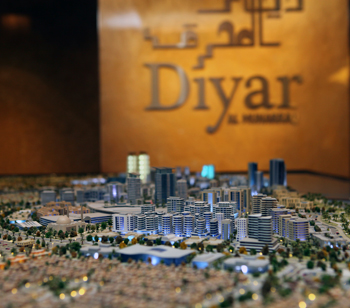
Most of the projects are in the design stage right now. We tendered the affordable homes, we are in the final design stage of Dragon City, and we have Bahrain University coming soon to DIYAR AL MUHARRAQ and two other private universities. We have the medical city which is a new concept. We’ve seen lots of demand in terms of the medical centers so we have changed the master plan to include them in our project. We have about three medical centers who wanted to be included.
What is the foreign vs. domestic percentage when it comes to the investors or people in business with Diyar?
We are in the very early stages in terms of investors. We have been talking to some but we have not signed any deal with any foreign investors. We expect before the end of this year that we will sign with some foreign investors.
Do you think that Diyar is an attractive option for foreign investors?
I believe that DIYAR AL MUHARRAQ is one of the best options available for investment due to its location, its opportunities, its mixed use and its master plan that gives the variety for many investors to come and invest whether they want to make a hotel, university or medical center or even a residential project.
You mentioned in the past that the project would compare to South Beach in Miami but still adhere to Bahrain culture. Is the director of the project still following this goal?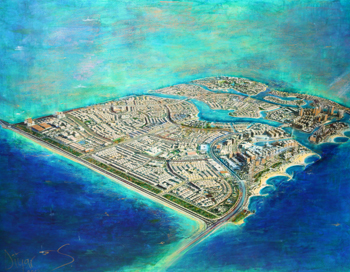
Yes, this is one of the unique parts of DIYAR AL MUHARRAQ. The beaches are complete and we are working on the design of that strip. It’s going to be a unique project in DIYAR AL MUHARRAQ and will add value to Bahrain as well.
With the growing population in Bahrain, do you believe that your project is going to play a major role?
Being the biggest project in Bahrain, of course. The scale of economy and the demand we have, especially for affordable homes and other elements or parts of DIYAR AL MUHARRAQ as we mentioned previously, including the schools, medical centers, universities, hotels, and malls plus Dragon City. This gives us heavy weight in terms of scale.
How important was it to just use local production and material during the construction phase?
This adds great value to the local market as well as enhances the real estate market, especially in terms of product and materials. As you know, the real estate industry will make work for another 16 sectors within that. So if you build any project, there are 16 other sectors that will have work such as aluminum, steel, sand, and building materials. This is how important it is to enhance the economy of any country.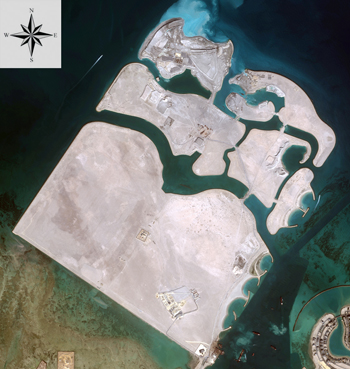
With the events that shook the world in 2009 – and Bahrain in particular -, which affected the real estate sector in particular, how did you react to the long-term ramifications?
When we started this project, it was to cater to the local market as our first market. There is a real demand in Bahrain, especially for affordable homes. The Bahrain market is healthy and is not based on speculators. We did not have a speculation trend even before 2008. All of these elements give us good reasons to move forward with the project, having the demand as our baseline.
In a recent interview you noted that land prices are forecast to increase in two or three years’ time so now is the most opportune time to start developing. In your opinion, what are the factors that will drive the real estate prices in Bahrain?
I think the scarcity of land is a big factor. As you know, Bahrain being a small island, we have shortage of land. The population is increasing. Not only this, but with the location of our project in Muharraq Island, there is basically no land. That is why it is important to have that project on that side of Bahrain. So mainly it is lack of land and the demand on that part of Bahrain. In Bahrain, we are a small island with lots of population, having a house or a villa is a must. It’s one of people’s top priorities which are why everyone wants to have a house. That’s why we have huge demand and we have scarcity of land.
Over the years the list of families looking for affordable housing has grown extensively. The government estimates this list to be 54,000 people.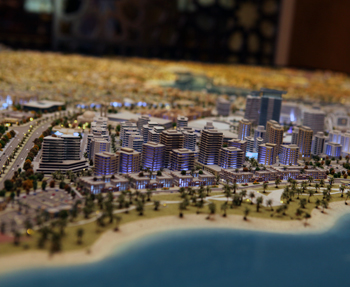
There are about 57,000 people on the waiting list. The government of Bahrain’s forecasting has given this huge attention and care, and they are working hard to solve this problem but I think this problem is bigger than what the government can solve on its own. So we’ve been talking with the Minister of Housing for some time now. I think there will soon be some sort of partnership between the private sector and the Ministry of Housing to solve this problem. Recently they signed a Public Private Partnership agreement with one of the companies. We expect more agreements to be signed this year.
We have also seen an increase in lending activities from the banks as one of the major challenges for the real estate industry also.
Financing is available in Bahrain or the world generally. The funding is there and the projects are there but people are more cautious now than before. That has slowed the frequency or speed of the real estate industry. We are not worried about this. If you have the money and financing then that’s a positive. Most of the developers in Bahrain have not supplied the market with extra units or extra product. The good thing is Bahrain is going in a steady direction with certain units every year and I think that’s a healthy practice.
We don’t have a phenomena of projects lacking funding. Maybe one or two but that’s the odd case and this is happening everywhere. But you cannot say this is the theme or the pattern of a country because I think in any country there is a project that’s been stopped. This is healthy and this is common. In Bahrain we have one or two projects that I know of that have been stopped or more accurately, delayed or rescheduled.
What I was reading is that you proposed to raise the level on the affordable housing mortgages so people can afford more. It’s basically saying that the government should increase the limit on how much money a family can borrow in the affordable housing market in what could be classified as low-interest loans.
To support or give more incentive to the developers anywhere, but especially in Bahrain with the social housing problem, I think this is one of the things they could use to help more people become capable of buying villas and housing. This is one of the things we’ve been talking about with the government and even the banks. Lowering interest will help the real estate industry a lot in terms of more people being able to buy houses.
And you’ve been advocating this? How would this work?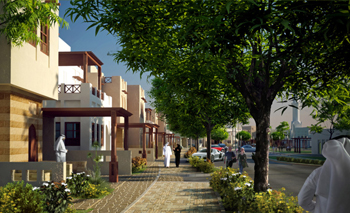
We’ve been talking to the government. There is a positive message we’ve been hearing and we hope something will happen in this regard. In terms of how it would work, the government could pay the extra or subsidize the loan or subsidize the down payment.
“In 2011, the government issued a tender for a consulting study to evaluate the current legal framework and propose a new set of property laws and regulations. The Bahrain Property Development Association which was founded in 2010 is also working with the government to address these challenges.” What exactly are the recommendations of the association? What should Bahrain do?
This association, BaPDA, is the identity of the real estate industry or body in Bahrain and we’re considering the entrance of that sector. With the next project in Bahrain, we miss a few laws that will enhance this industry so we’ve been in talks with the government to enhance some laws and we need some new laws as well. The government’s response was very positive. They hired an international consultant to do a study on the market and propose new laws that will help the industry to flourish and regulate the relationship between the master developers / sub-developers / end users. I think that will add great value to the industry.
What in your opinion are the particular laws that still hinder development?
The relationship between the master developer and their sub-developers. As I said, the government is working on this. We just finished modifying a new law for the real estate mortgage law as well with the parliament. So the good thing is that any law related to this industry will be passed through BaPDA so they can give their point of view before it goes to the parliament.
You mentioned Public Private Partnerships. In your opinion, what should be done and what is the major challenge in developing PPPs?
As I said, PPP is a new thing in Bahrain. They have been doing this in America for many years. That is why it took so long to process. Since they signed I think it is still in the final stage because it’s a new experience and they want to study it carefully. Once it’s signed and agreed upon, then future agreements will go much more smoothly.
Is there anything else you would like to add about Diyar projects? The economy may drive prices up but in the end it may be negative because some people may be left out.
Nobody will be left out because the people who cannot afford to buy their home in Bahrain or in DIYAR AL MUHARRAQ will be taken care of by the Ministry of Housing. I think Bahrain – with its size and what it offers for Bahrainis – is much more than their expectation. Imagine if you are guaranteed a villa or an affordable house with all the amenities – all of which is heavily subsidized. Nobody can compete with the Ministry of Housing’s scheme because it’s heavily subsidized. We as a private sector try to help as much as we can but again, because it’s heavily subsidized we cannot compete with them. That’s why we call it affordable housing. If we as a private sector get the incentive or the subsidy that they get from the Ministry of Housing, we’ll be able to offer more to the market.